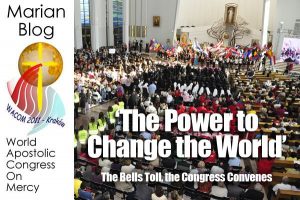+ + + 2:57 p.m. + + +
By the way, some of the biggest names in the Church will be participating. View the VIP list.
+ + + 1:48 p.m. + + +
With a zeal to bring the Divine Mercy message into the daily life of the Church and the world, thousands of people from around the world are disembarking here at the Shrine of Divine Mercy in Lagiewniki, Poland, on the grounds of the convent where in the 1930s St. Faustina received many of her revelations.
The five-day World Apostolic Congress on Mercy begins tomorrow at 9 a.m.
The Congress is nothing short of an historic event in the life of the Church, “opening a new chapter in our understanding more and more the mystery of Divine Mercy and the special gift God gave us through St. Faustina and John Paul,” says Sr. Gaudia of the Congregation of the Sisters of Our Lady of Mercy.”
View our interview with Sr. Gaudia …
“We believe that the Divine Mercy is the keyword, the paradigm for a new evangelization. It will be the light guiding humankind of the third millennium,” said Fr. Fr. Patrice Chocholski of Lyon, France, general secretary of the Congress.
The Congress follows in the heels of the historic first World Apostolic Congress on Mercy (WACOM) held in Rome, Italy, on April 2-6, 2008, an event called for by Pope Benedict XVI to perpetuate the work of Blessed John Paul II, the Great Mercy Pope.
“Mercy as the Source of Hope” is the theme for the Congress, which will include testimonies, lectures, street celebrations, Holy Masses, missions, and a day trip to the Auschwitz-Birkenau Museum. A Church congress is a Vatican-approved gathering focusing on a particular aspect of the faith — in this case, mercy.
Appropriately, the venue is here in Lagiewniki, home of the Congregation of the Sisters of Our Lady of Mercy. Saint Maria Faustina Kowalska received many of her revelations here, which she recorded in her Diary — a book that has since sparked a worldwide missionary front in the name of Jesus, The Divine Mercy.
The venue serves to underscore the critical role the message of The Divine Mercy now has in the Universal Church.
At the conclusion of the first Congress, our Holy Father encouraged pilgrims to return home to sure up an apostolic beachhead in which the zeal of the Mercy Congress could take root and flourish.
“Go to the world and be witnesses of Divine Mercy,” Pope Benedict XVI urged participants.
Bridging the two World Congresses were national Congresses held throughout the world, including the North American Congress on Mercy, in Washington, D.C., on Nov. 14-15, 2009.
The beatification on May 1 — Divine Mercy Sunday — of John Paul II, provides the perfect lead-in to the Mercy Congress. In his writings and homilies, Pope John Paul II described Divine Mercy as the answer to the world’s problems and the message of the third millennium.
In 1997 he visited then-Blessed Faustina’s tomb here in Lagiewniki and proclaimed: “There is nothing that man needs more than Divine Mercy. … From here went out the message of Mercy that Christ Himself chose to pass on to our generation through Blessed Faustina.”
Cardinal Stanislaw Dziwisz, Archbishop of Krakow and longtime aide to Pope John Paul II, is host of the Mercy Congress. Among the many cardinals and bishops who will participate will be Cardinal Christopher Schönborn, Archbishop of Vienna, who served as master of ceremonies for the World Congress in Rome.
Among the many highlights, Pope Benedict XVI will present a special message to Congress attendees.
“The Congress will help people come to know God as a God of mercy who can cure us from our brokenness, our sinfulness and our fears,” said Fr. Kazimierz Chwalek, MIC, the Marians’ Provincial Superior in the United States and the vice-president of the North American Mercy Congress. “We will share how He wants us to do the same for each other — to carry each others’ crosses — in a world in desperate need of His profound gift of mercy.”




